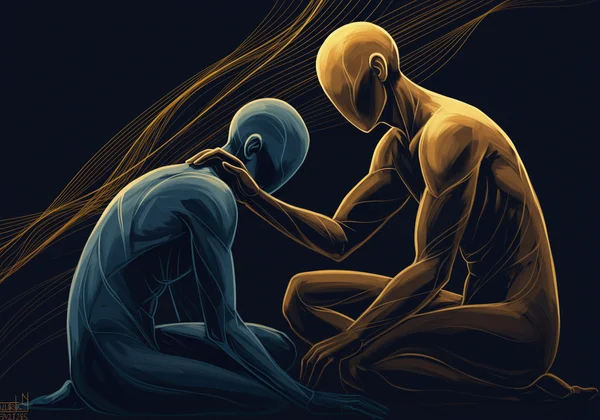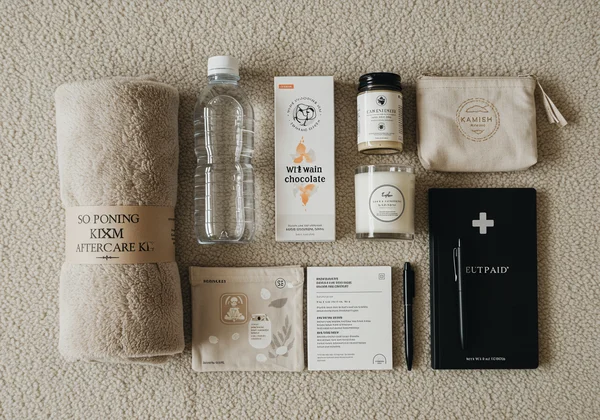The Ultimate BDSM Aftercare Guide: A Post-Kink Test Essential
August 17, 2025 | By Ethan Cole
Exploring the depths of your desires through kink can be a thrilling, intense, and profoundly connecting experience. After the adrenaline fades and the scene ends, however, it's common to feel a wave of vulnerability, exhaustion, or even sadness. This is a completely normal emotional and physiological response. But what is aftercare and how can it help? This comprehensive guide will explore the essential practice of BDSM aftercare, a cornerstone of safe, sane, and consensual play that deepens trust and connection.
The journey into understanding your desires begins with self-knowledge. Before you can communicate your needs to a partner, you must first discover them. A great starting point is to take the free Kink Test to gain private, non-judgmental insight into your unique preferences and boundaries.
What is Aftercare in Kink and BDSM?
At its core, aftercare is the process of emotional and physical support given to all participants after a BDSM or kink scene has concluded. It's the gentle transition from the heightened reality of the scene back to the everyday world. Think of it as a dedicated time for reconnection, reassurance, and recovery. This practice isn't an optional extra; it's a non-negotiable part of the experience that ensures everyone feels safe, valued, and cared for long after the play has stopped. It is a fundamental component of kink safety.

The Psychology Behind the Need for Aftercare
During an intense scene, your body is on a physiological rollercoaster. It produces a powerful cocktail of hormones, including adrenaline (for fight-or-flight) and endorphins (the body's natural painkillers and mood elevators). When the scene ends, the levels of these hormones can plummet, leading to what is commonly known as "drop." For a submissive, this is often called sub drop, but dominant partners can experience a similar phenomenon known as top drop.
This drop can manifest as feelings of anxiety, sadness, loneliness, or even shame. It’s not a sign of weakness or that something went wrong; it's a natural biochemical reaction. Aftercare helps regulate this process by introducing a new set of hormones, like oxytocin and dopamine, which are associated with bonding, comfort, and pleasure. Cuddling, gentle touch, and verbal praise are powerful tools to combat the effects of this adrenaline crash.
Physical vs. Emotional Aftercare: A Two-Part Process
Effective aftercare addresses both the body and the mind. It’s a holistic approach that recognizes the deep connection between our physical and emotional states. Neglecting one for the other can leave participants feeling unsettled or incomplete.

- Physical Aftercare: This focuses on the body's immediate needs. It can involve tending to any marks or bruises with ice packs or salves, rehydrating with water or juice, eating a snack to restore blood sugar, stretching sore muscles, or simply wrapping up in a warm, soft blanket.
- Emotional Aftercare: This is about tending to the heart and mind. It includes checking in with each other, offering praise and verbal reassurance, cuddling, sharing feelings about the scene, and reaffirming the bond and trust between partners. This part is crucial for processing the experience in a positive way.
Aftercare vs. Negotiation: Understanding the Difference
Newcomers to kink often confuse aftercare with negotiation, but they serve two distinct and vital purposes. Negotiation happens before a scene. It is the process of discussing desires, setting hard and soft limits, choosing a safe word, and outlining exactly what the scene will entail. It establishes the framework for safe play.
Aftercare, on the other hand, happens after the scene. It is the follow-through on the promise of care and respect made during negotiation. While you might discuss general aftercare preferences during negotiation, the act itself is the tender conclusion to the entire experience. Understanding your own needs is key to a successful negotiation, which is why a sexual preference test can be such a valuable tool.
A Practical Kink Aftercare Guide for Every Role
Aftercare is a shared responsibility, but the specific needs can differ depending on one's role in the scene. A truly effective kink aftercare guide acknowledges that everyone involved, regardless of their role, requires and deserves care. It’s a practice of mutual respect.

Aftercare Tips for Submissives and Bottoms
Those in a submissive or bottoming role often place immense trust in their partners, making them particularly vulnerable to drop. Aftercare is essential for reaffirming that trust and making them feel cherished.
- Ask for what you need: It's okay to have specific needs. Whether you want to be held, praised, or just left to rest quietly with them nearby, communicate your desires.
- Gentle touch: Non-demanding physical contact like stroking hair, holding hands, or cuddling can be incredibly grounding.
- Warmth and comfort: A warm bath, a cozy blanket, and a cup of tea can do wonders for a body coming down from an intense state.
The Dominant's Role: How Tops Can Provide Effective Aftercare
A dominant or top’s responsibility doesn't end when the scene does. Providing aftercare is one of the most significant ways a Top demonstrates their care and trustworthiness. Additionally, tops can experience top drop, often feeling a sense of guilt, emptiness, or worry after a scene.
- Be present and attentive: Put away your phone and focus solely on your partner. Observe their body language and listen actively.
- Initiate reassurance: Don't wait for them to ask. Offer praise like, "You did so well," or "Thank you for trusting me."
- Care for yourself: Acknowledge your own emotional state. Receiving comfort from your partner or engaging in self-care is also vital. A good dynamic is built on mutual care. Knowing your tendencies through a dom sub test can help you anticipate these needs.
What If You Practice Kink Solo? A Guide to Self-Aftercare
Exploring kink on your own is a valid and rewarding journey. When you play solo, you are both the dominant and the submissive, meaning you are also responsible for your own self-aftercare. This act of self-compassion is crucial.
- Schedule time for it: Don't just rush back to your daily tasks. Intentionally block out 15-30 minutes to wind down.
- Prepare your space: Have a comfort kit ready with a blanket, a favorite snack, and a calming playlist.
- Journal or reflect: Write down how you're feeling. Acknowledge the experience and praise yourself for exploring your desires safely.
Creative Aftercare Ideas to Deepen Your Connection
Aftercare doesn't have to follow a rigid script. The best aftercare is personalized and creative. Thinking about aftercare ideas together can be a bonding experience in itself and helps ensure everyone’s needs are met. Knowing what you might enjoy is the first step, something an initial free kink test can help clarify.
The Aftercare Kit Checklist: Items to Have on Hand
Being prepared can make the transition into aftercare seamless. Consider creating a dedicated aftercare kit with items that promote comfort and care.

- Hydration & Snacks: Water, juice, and something small and easy to eat like chocolate or crackers.
- Comfort Items: Soft blankets, oversized hoodies, or fuzzy socks.
- First Aid: Antiseptic wipes, lotion, or any specific balms for rope marks or light bruising.
- Soothing Sensory Items: A calming playlist, scented candles (with a safe scent), or a soft stuffed animal.
Verbal Reassurance: Words of Affirmation to Use
Never underestimate the power of words. For many, hearing positive affirmations is the most important part of aftercare.
- "You were incredible."
- "Thank you for sharing that with me."
- "I feel so close to you right now."
- "You are safe and cherished."
- "I value you and our connection."
Planning Your Aftercare During Negotiation
The best way to ensure great aftercare is by planning your aftercare during negotiation. Before a scene begins, take a moment to ask each other: "What do you think you'll need afterward?" This simple question removes guesswork and shows a deep level of respect for each other's well-being. It transforms aftercare from an afterthought into an integral part of the shared experience.
Aftercare: The Key to Confident and Fulfilling Exploration
Aftercare is far more than just a pleasant epilogue to a kink scene; it is the heart of ethical and sustainable play. It is an act of kindness, a demonstration of trust, and the glue that holds a dynamic together. By prioritizing physical and emotional recovery, you build a foundation of safety that allows for bolder and more fulfilling exploration.
The journey to fulfilling exploration always starts with self-knowledge. If you're ready to better understand your own needs, take the free Kink Test to get your private, personalized results. It's the first step to unlocking your desires, communicating them with confidence, and building deeper, more trusting connections.
Frequently Asked Questions About Kink Safety
What is a safe word and why is it so important?
A safe word is a pre-agreed-upon word or signal used to immediately stop a scene, no questions asked. It's critical because it ensures that consent is ongoing and can be withdrawn at any time. It's the ultimate safety net, giving the person in a submissive role complete control over their well-being.
How do I talk to my partner about kinks and aftercare?
Choose a calm, neutral time outside of the bedroom. Start by expressing your trust and appreciation for them. You can use a tool as a conversation starter, saying something like, "I took this interesting sexual preference test and it made me think about us. Would you be open to talking about it?" Approach the topic with curiosity, not demand, and frame it as a way to deepen your connection.
Is it normal for my kinks to change over time?
Yes, it is completely normal. Just like any other aspect of your personality, your desires, interests, and boundaries can evolve with time, experience, and self-reflection. Re-visiting a kink test periodically can be a fun way to check in with yourself, discover new interests, and see how you've grown. Your journey is uniquely yours, and it's okay for the path to change.